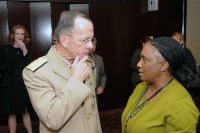NEW ORLEANS — Military readiness is directly tied to family readiness, the chairman of the Joint Chiefs of Staff told National Guard family program volunteers here yesterday.
“This is our ninth year at war,” Navy Adm. Mike Mullen said. “We continue at a level that has generated extraordinary results from the best military that I have ever been associated with in some 40-plus years.”
Providing support to families of Guard members has been a vital component to mission success, Mullen told the volunteers. “We couldn’t be anywhere close to where we are without you,” he said.
The National Guard has transformed since Sept. 11, 2001, Mullen said. “There’s no institution where things have changed more dramatically than in the Guard,” he said. “We would not be anywhere close to where we are in terms of our execution of mission without the Guard and reserve.”
And like other elements of the armed forces, the chairman said, the Guard has improved its family programs. “You represent the best of the best,” Mullen told attendees at the 2010 National Guard Family Program Volunteer Workshop.
“You represent so much of what America is, coming from every single community across the land,” Mullen told the group. “Thanks for your dedication. Thanks for your service. Thanks for caring about those who are serving and who are sacrificing.”
Further improvement in family readiness can be achieved across the military, Mullen said, but that does not mean new programs. “We have seen our programs multiply by the dozens,” he said. “I don’t need any more programs. I need the ones we have to really be working well.”
States, territories and the District of Columbia should share best practices to improve existing programs, Mullen said. “We don’t have time to have everybody developing a best practice,” he explained. “Exchanging ideas … on what’s working and what isn’t is absolutely critical.”
Community-based support can be improved, Mullen said, and the same is true of efforts to eliminate the stigma surrounding the seeking of help for treatment of traumatic brain injury and post-traumatic stress. Other important issues, he said, include homelessness among veterans, medical plans, suicide prevention and programs for wounded warriors.
“The emphasis is on disability and money,” Mullen said. “The emphasis needs to be on ability and on people and on their future.”
It was the chairman’s second visit to a National Guard Family Program Volunteer Workshop. He first attended the annual event in 2008.
“To me, this is an inspirational group,” Mullen said after his visit with workshop attendees. “They care a lot, they work the issues, and there is a lot of capability there.”
Throughout the armed services, “we have made enormous improvements in focusing on our families,” Mullen said.
“I don’t think any of us can rest on our laurels,” he added, “and we need to move forward.”
Leadership needs to look at what has gone well and seek to fill any gaps to ensure families’ needs are being met, the chairman said.
“This is not an infinite list,” Mullen said. “It is schools. It is child care. It is medical care. It is … preparation for deployment. It is what we do on deployment. What do we do when we get back? … And address the stress levels, which are clearly there, and it’s something that’s going to be with us for a significant period of time.”
Addressing suicide in the armed forces, Mullen said everyone has a responsibility to attack the problem. “Leadership has to stay focused on this,” he said. “I’m talking about leadership at the E‑4, E‑5 and E‑6 level. All of us have a responsibility.
“It’s a very complex problem,” he continued. “We need to understand it. We need to thoroughly conduct training so people understand symptoms and can head this thing off. Oftentimes, buddies and families are the first ones that see the symptoms.”
Increased time at home between deployments as operations in Iraq wind down will help, Mullen said.
“That will take some of the pressure off,” he told the group. “That said, it’s not just all about deployments, because there have been an awful lot who have committed suicide that haven’t deployed, so there’s a completely comprehensive approach that has to be taken here.”
2010 is a year of increasing discussion about the future of the transformed National Guard. The Guard’s participation in overseas operations has transformed the force, Mullen said. “That participation fundamentally changes every unit that goes,” he said. “It changes the whole military mix in that state, and we need to learn from that.
“Longer term,” he continued, “what does a strategic reserve look like? What does an operational reserve look like? And what’s the rotational cycle? That’s still all to be determined.”
Source:
U.S. Department of Defense
Office of the Assistant Secretary of Defense (Public Affairs)

 von
von 

